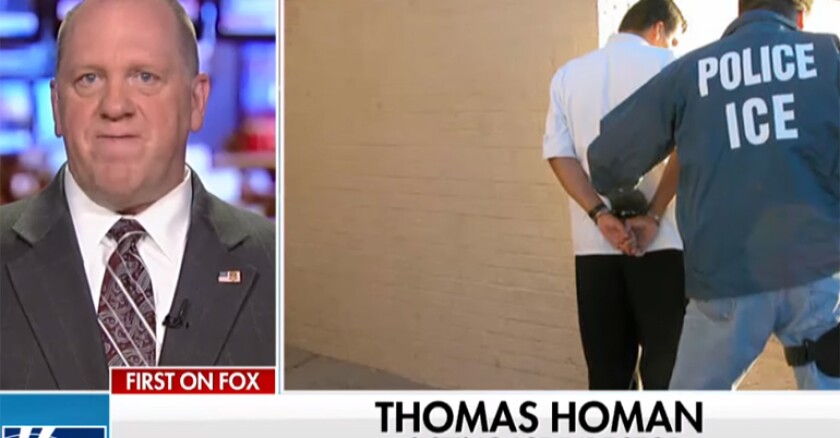“We've got to take [sanctuary cities] to court, and we've got to start charging some of these politicians with crimes,” Thomas Homan told Fox News’ Neil Cavuto. He added that the federal Department of Justice should “file charges against the sanctuary cities” and “hold back their funding.”
Homan, who President Trump tapped to be ICE's permanent director and awaits confirmation in the U.S. Senate, pointed to a specific federal law, 8 U.S.C. 1324, which outlines criminal penalties (including jail time) for smuggling and harboring people in the country illegally.
“These sanctuary cities that knowingly shield and harbor an illegal immigrant in their jail and don’t allow us access ... that is in my opinion a violation of 8 U.S.C. 1324, that’s an alien smuggling statute,” he said. “I’ve asked the Department of Justice to look at this.” (As ICE director, Homan would not have direct power to bring charges against elected officials -- that rests with the DOJ).
But state and local officials of immigrant sanctuaries can rest assured they won't be going to jail. Constitutional law and immigration experts consulted by Governing say that it would probably be impossible for the federal government to arrest public officials for enacting sanctuary laws and policies.
"[8 U.S.C. 1324] is obviously a criminal law designed to crack down on human trafficking," says Steven Schwinn, a professor at John Marshall Law School and author of the Constitutional Law Prof blog. "It’s not obvious to me that it would or would not apply to sanctuary cities, but applying it this way would be a gross misuse of power."
What’s more, Schwinn says, applying the law in a way that forces states or localities to cooperate with federal immigration enforcement officials could be a violation of the anti-commandeering principle, a long-standing legal precedent established by the U.S. Supreme Court that prevents the federal government from forcing state governments to do something.
“Using [1324] like this would basically be [the federal government] saying ‘assist us with enforcement of federal immigration laws or go to jail,” Schwinn says. “It’s hard to see that as anything but commandeering.”
In its attempts to punish sanctuary jurisdictions, the Trump administration has focused on another federal law, 8 U.S.C. 1373, which prevents states and localities from refusing to share information about an individual’s immigration status with the federal government. U.S. Attorney General Jeff Sessions has made compliance with this law a requirement to receive certain public safety funding. Though many legal scholars think that's unconstitutional, a federal judge upheld the requirement in September while placing a nationwide injunction on other federal policies aimed at forcing cities to cooperate with immigration officials.
But if the federal government were to try and use 1373 to prosecute elected leaders, as Homan suggested, it likely wouldn’t get very far either.
“There is no criminal law penalty for violating 1373,” says Ilya Somin, a law professor at George Mason University and an adjunct scholar at the libertarian Cato Institute. “Even if it were possible to pull funds [due to noncompliance with 1373], that’s not the same thing as criminalizing violations.”
Somin also believes that 1373 itself is unconstitutional because, he says, it violates the anti-commandeering principle. But even in its fullest application, he says it could not put public officials in jail.
Other legal experts agree that Homan’s suggestion would fly in the face of precedent in situations like this.
“It’s important to make the distinction between the justice department considering suing a particular government for adopting a law that allegedly violates federal law, which is a very common practice,” says César Cuauhtémoc García Hernández, an associate professor at the University of Denver Sturm College of Law and publisher of crImmigration.com. “That is very different from what Director Homan endorsed in his comments, referencing the criminal prosecution of elected officials.”
In his Fox interview, Homan turned particular attention to the state of California, where the country's furthest-reaching sanctuary state legislation took effect on Jan. 1. ICE officials, Homan said, will increase their enforcement presence in California as a result of the new law.
“If [California Gov. Jerry Brown] thinks he’s protecting immigrant communities, he’s doing quite the opposite," he said. "If you think ICE is going away, we’re not."
A spokesperson for the governor’s office responded to Governing via email: “We’d encourage this individual to better educate himself on what laws in California do and don’t do before fear mongering on Fox News,” says Evan Westrup, a spokesperson for Brown’s office.
Westrup pointed out that the law does not prevent ICE from doing its own work in any way but diverts local policing resources away from immigration-related issues.









